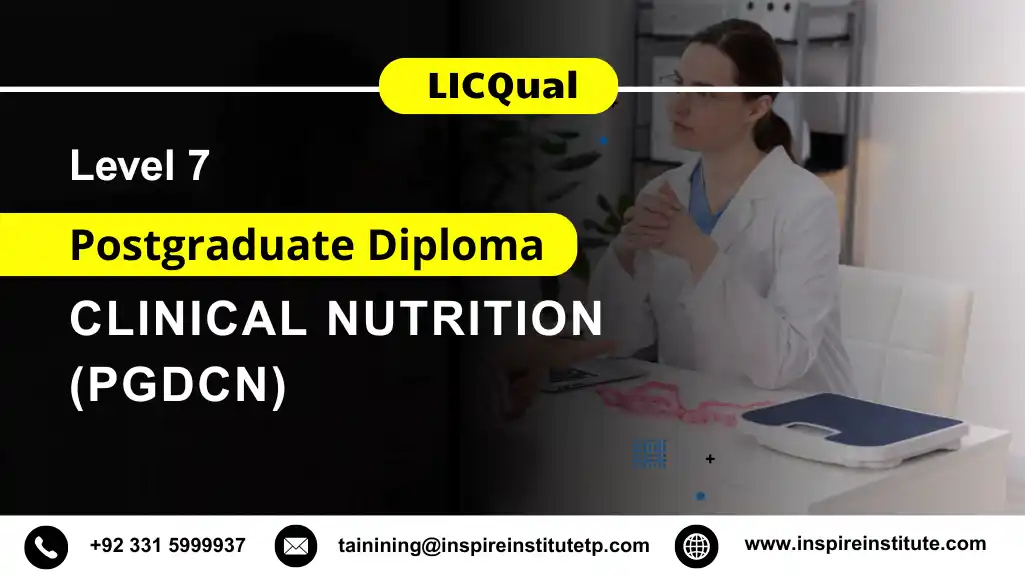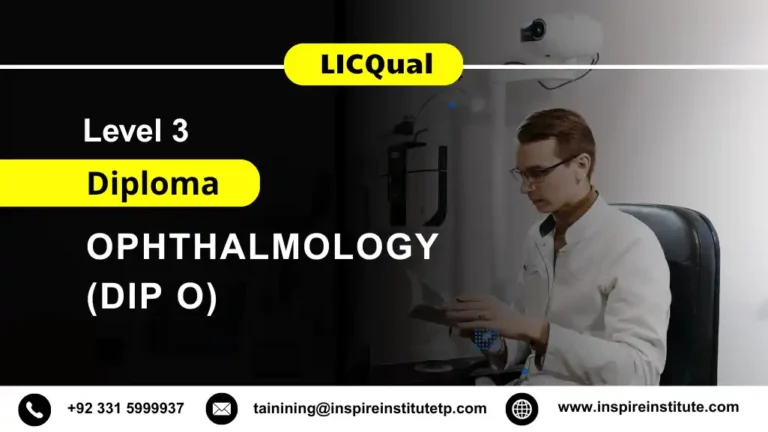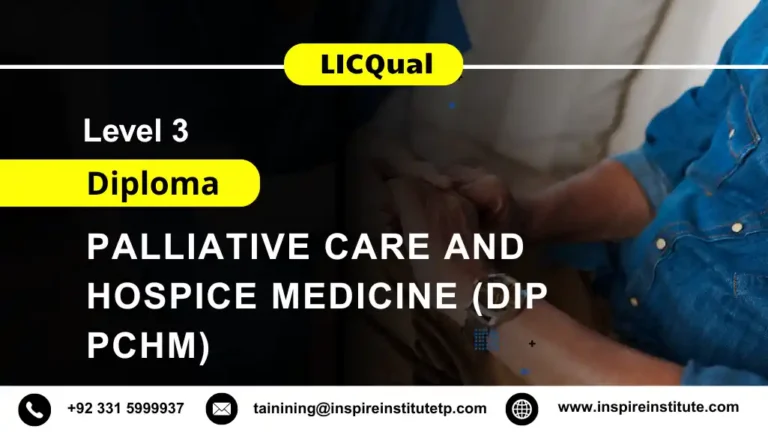LICQual Level 7 Postgraduate Diploma in Clinical Nutrition (PgDCN)
The LICQual Level 7 Postgraduate Diploma in Clinical Nutrition (PgDCN) is a UK-accredited qualification designed for healthcare professionals, dietitians, nutritionists, and medical practitioners seeking to advance their expertise in clinical nutrition and therapeutic dietary interventions. This comprehensive, assignment-based programme equips learners with the knowledge and practical skills to assess, plan, and implement evidence-based nutrition strategies that improve patient outcomes across diverse healthcare settings. Through a combination of theoretical learning and applied practice, graduates gain the competencies required to address complex nutritional challenges in clinical practice.
This course provides a deep understanding of human metabolism, nutritional biochemistry, and the role of nutrition in disease prevention and management. Learners explore advanced topics such as clinical dietetics, enteral and parenteral nutrition, nutritional support for chronic illnesses, and the management of metabolic disorders. The program emphasizes evidence-based practice, enabling professionals to critically evaluate scientific research and apply it to individualized patient care plans.
Practical application is central to the PgDCN curriculum. Through case studies, clinical simulations, and research-driven assignments, learners develop hands-on skills to assess patient nutritional needs, design tailored intervention plans, and monitor outcomes effectively. The course also strengthens interdisciplinary collaboration, ensuring that graduates can work efficiently within healthcare teams to optimize patient nutrition and health outcomes.
The LICQual Level 7 Postgraduate Diploma in Clinical Nutrition is a prestigious, UK-accredited qualification recognized internationally. Graduates are equipped with the credentials to enhance their professional credibility, access advanced clinical roles, and pursue opportunities in hospitals, private clinics, public health institutions, and research organizations worldwide.
Why Choose this Qualification
The LICQual Level 7 Postgraduate Diploma in Clinical Nutrition (PgDCN) is designed to equip healthcare professionals, dietitians, and medical practitioners with advanced knowledge and practical expertise in clinical nutrition. Choosing this qualification ensures learners gain internationally recognised credentials while mastering evidence-based nutritional strategies to improve patient outcomes and advance professional growth.
Key Reasons to Choose this Qualification
Specialist Knowledge
- Gain comprehensive understanding of human metabolism, nutritional biochemistry, and clinical dietetics.
- Explore advanced nutritional interventions for chronic illnesses, metabolic disorders, and disease prevention.
- Learn to critically appraise nutritional research and evidence-based practice guidelines.
- Understand the physiological impact of diet on health and disease across different population groups.
- Develop skills to integrate nutrition knowledge into holistic patient care plans.
Practical Application
- Apply theoretical knowledge to real-world clinical scenarios and patient care strategies.
- Conduct comprehensive nutritional assessments and design individualized intervention plans.
- Participate in case-based learning and simulation exercises to strengthen hands-on skills.
- Implement evidence-based protocols for enteral and parenteral nutrition management.
- Collaborate effectively with multidisciplinary healthcare teams for optimal patient outcomes.
Recognised Qualification
- Earn a prestigious, UK-accredited Level 7 Postgraduate Diploma in Clinical Nutrition.
- Gain international recognition of your advanced clinical and professional competencies.
- Enhance credibility in hospitals, private clinics, public health institutions, and research organisations.
- Meet global standards for clinical nutrition practice, opening diverse career opportunities.
- Strengthen eligibility for leadership, consultancy, and academic positions in the nutrition field.
Flexible Learning Pathway
- Study at your own pace without disrupting professional or personal commitments.
- Access digital learning resources, structured guidance, and expert mentorship.
- Balance practical healthcare responsibilities while completing advanced academic assignments.
- Benefit from self-paced modules designed for working professionals in clinical environments.
- Achieve learning goals efficiently through structured but flexible online learning pathways.
Evidence-Based Training
- Engage with cutting-edge research, clinical guidelines, and nutritional innovations.
- Develop skills to critically evaluate scientific literature and apply evidence in clinical practice.
- Learn advanced techniques for diet therapy, nutritional support, and patient monitoring.
- Understand regulatory, ethical, and cultural considerations in clinical nutrition.
- Promote innovation and quality improvement in healthcare nutrition services.
Career Development
- Open advanced career pathways in hospitals, private practice, research organisations, and public health.
- Prepare for senior clinical roles, academic teaching, consultancy, and leadership positions.
- Develop expertise that enhances employability and professional recognition worldwide.
- Build a strong foundation for doctoral-level research or specialised clinical nutrition certifications.
- Expand professional networks and collaborations in healthcare and nutrition sectors.
Enhanced Patient Impact
- Deliver safe, ethical, and patient-centred nutritional care across clinical settings.
- Improve health outcomes by designing personalized dietary plans based on clinical evidence.
- Address complex nutritional needs for chronic illnesses, metabolic disorders, and preventive health.
- Educate and support patients to adopt sustainable, evidence-informed dietary practices.
- Contribute to higher standards of care and measurable improvements in population health.
Professional Growth
- Strengthen critical thinking, clinical reasoning, and decision-making abilities.
- Develop leadership, communication, and team management skills within healthcare settings.
- Foster reflective practice, continuous learning, and professional integrity.
- Gain confidence to lead clinical teams, research initiatives, and training programs.
- Become a recognised expert in clinical nutrition with the ability to influence healthcare policies.
The LICQual Level 7 Postgraduate Diploma in Clinical Nutrition (PgDCN) empowers learners to combine advanced theoretical knowledge with practical application, gain internationally recognised credentials, and significantly enhance both career prospects and patient care outcomes globally.measurable impact on professional development, clinical competence, and healthcare excellence globally.
Course Overview
LICQual UK Awarding Body
Average Completion Time:
6-24 Months
Study Units: 6 Units
Evidence & Assignment Based
Mandatory Units
Who Should Take This Course
The LICQual Level 7 Postgraduate Diploma in Clinical Nutrition (PgDCN) is designed for healthcare professionals who aim to enhance their expertise in advanced nutrition, dietetics, and clinical care. This qualification is ideal for those seeking to integrate evidence-based nutritional strategies into patient management, improve healthcare outcomes, and expand career opportunities in clinical, research, and public health settings.
This course is suitable for
Healthcare Professionals
- Medical doctors, nurses, and allied health practitioners seeking advanced knowledge in clinical nutrition.
- Professionals aiming to incorporate nutritional interventions into patient care plans effectively.
- Clinicians who wish to enhance their skills in managing diet-related chronic diseases and metabolic disorders.
- Practitioners looking to provide evidence-based dietary guidance within multidisciplinary teams.
- Professionals aiming to stay updated with global standards in nutritional practice and healthcare.
Dietitians and Nutritionists
- Registered dietitians seeking postgraduate-level expertise in clinical nutrition.
- Nutritionists aiming to specialise in therapeutic diet planning for diverse patient populations.
- Professionals wanting to enhance critical evaluation and application of nutritional research.
- Practitioners interested in managing complex nutritional cases in hospital or community settings.
- Those aspiring to lead dietary programs and nutritional interventions in healthcare institutions.
Public Health Specialists
- Public health practitioners working on nutrition-related community programs.
- Professionals aiming to design and implement preventive health strategies using nutrition.
- Policy makers and health educators seeking evidence-based knowledge to improve population health.
- Specialists looking to integrate clinical nutrition into broader public health initiatives.
- Professionals focused on monitoring, evaluation, and improvement of dietary programs.
Fitness and Sports Professionals
- Personal trainers and sports coaches seeking advanced knowledge in sports nutrition.
- Physiotherapists aiming to support recovery and performance through tailored nutrition plans.
- Health and wellness consultants looking to combine clinical nutrition with lifestyle interventions.
- Professionals working with athletes or physically active populations for dietary optimisation.
- Individuals aiming to apply nutrition science to enhance performance, endurance, and recovery.
Researchers and Academics
- Academic faculty and educators wishing to teach evidence-based clinical nutrition.
- Researchers seeking advanced skills to conduct nutrition-related clinical trials and studies.
- Professionals aiming to publish findings in nutrition, dietetics, and healthcare journals.
- Learners interested in integrating research outcomes into clinical and public health practice.
- Those pursuing further doctoral studies or specialised postgraduate research in nutrition.
Hospital and Clinical Managers
- Managers overseeing nutrition and dietetics departments in hospitals or clinics.
- Professionals responsible for designing dietary protocols and clinical nutrition policies.
- Staff coordinating multidisciplinary care teams for patients with complex nutritional needs.
- Leaders aiming to implement quality improvement initiatives in nutritional services.
- Professionals seeking to enhance operational efficiency in clinical nutrition delivery.
Graduate Students
- Recent graduates in medicine, nutrition, dietetics, or allied health sciences seeking advanced knowledge.
- Individuals preparing for careers in clinical nutrition, research, or healthcare leadership.
- Students aiming to bridge theoretical knowledge with practical applications in patient care.
- Graduates seeking UK-accredited postgraduate credentials to enhance employability.
- Professionals aspiring to specialise in therapeutic nutrition or dietetics in clinical practice.
International Healthcare Professionals
- Non-UK medical and allied health practitioners seeking globally recognised credentials.
- Professionals aiming to validate skills in clinical nutrition according to international standards.
- Those seeking flexible, assignment-based learning compatible with ongoing professional duties.
- International practitioners planning to implement advanced nutrition programs in their countries.
- Healthcare professionals aiming to expand career opportunities globally in nutrition and dietetics.
This course ensures that learners from diverse professional backgrounds acquire advanced clinical nutrition knowledge, practical skills, and internationally recognised credentials. Graduates are empowered to improve patient outcomes, lead nutritional interventions, and contribute to research and policy development in healthcare and public health globally.ngs.
Course Benefits
TThe LICQual Level 7 Postgraduate Diploma in Clinical Nutrition (PgDCN) is a UK-accredited qualification designed for healthcare professionals, dietitians, nutritionists, and aspiring clinical leaders who wish to advance their expertise in nutrition science, therapeutic dietetics, and patient-centred care. This comprehensive, assignment-based diploma combines rigorous theoretical foundations with practical applications, enabling learners to assess, plan, implement, and evaluate advanced nutritional interventions across diverse clinical settings. Through evidence-based learning and flexible study pathways, this qualification equips professionals to improve patient outcomes, enhance clinical decision-making, and contribute to global advancements in nutrition and healthcare.
Key Benefits of the Course
- Specialist Knowledge:
Learners gain an in-depth understanding of human nutrition, metabolism, and clinical dietetics. The course covers essential topics such as nutrition for chronic disease management, therapeutic diets, micronutrient metabolism, and nutritional assessment methods. It also addresses cutting-edge research in clinical nutrition, enabling learners to develop expertise in evidence-based dietary strategies for diverse patient populations. - Practical Application:
The PgDCN emphasizes hands-on, applied learning through case studies, clinical simulations, and research-based assignments. Learners enhance their ability to assess nutritional needs, design personalized nutrition plans, and implement dietary interventions effectively. The program develops skills in critical evaluation, interdisciplinary collaboration, and patient-centred practice to ensure measurable improvements in health outcomes. - Recognised Qualification:
This UK-accredited postgraduate diploma validates advanced professional competence in clinical nutrition. The LICQual Level 7 Postgraduate Diploma in Clinical Nutrition (PgDCN) is internationally recognised, ensuring graduates meet global standards and are well-positioned for senior clinical roles, academic opportunities, and leadership positions in healthcare, research, and public health organisations worldwide. - Flexible Learning Pathway:
The assignment-based structure allows working professionals to study at their own pace without disrupting their careers. Learners gain access to comprehensive online resources, structured academic guidance, and personalised mentorship. This flexible learning model balances career progression with advanced education, providing seamless integration of theory and practice. - Evidence-Based Training:
Learners engage with the latest clinical guidelines, research, and innovations in nutrition science. The course trains professionals to critically appraise scientific literature, apply evidence-based nutritional interventions, and implement innovative strategies in patient care. This approach strengthens clinical reasoning, analytical skills, and decision-making capabilities. - Career Development:
This qualification enhances career prospects across hospitals, private clinics, research institutions, and academic settings. Graduates may pursue roles such as Clinical Nutrition Specialist, Dietetic Consultant, Researcher, or Academic Lecturer. The diploma also provides a foundation for doctoral studies, specialised certifications, or leadership positions in nutrition and healthcare management. - Enhanced Patient Impact:
Graduates learn to deliver ethical, culturally sensitive, and patient-centred nutritional care. The PgDCN equips professionals to improve patient outcomes, manage diet-related disorders, and implement sustainable dietary interventions. Practitioners gain the confidence to address complex nutritional needs across diverse healthcare environments. - Professional Growth:
Learners develop critical competencies in clinical reasoning, leadership, communication, and interdisciplinary collaboration. The program encourages reflective practice, strategic decision-making, and professional innovation. Graduates emerge as confident leaders capable of advancing standards in clinical nutrition and shaping the future of patient care globally.
The LICQual Level 7 Postgraduate Diploma in Clinical Nutrition (PgDCN) empowers healthcare and nutrition professionals to become leaders in their field through advanced knowledge, practical expertise, and internationally recognised credentials. It enhances career opportunities while contributing to improved health outcomes and evidence-based nutritional practice worldwide.g significantly to improved patient care and urological health outcomes worldwide.
Eligibility Criteria
The LICQual Level 7 Postgraduate Diploma in Clinical Nutrition (PgDCN) is a UK-accredited qualification designed for healthcare professionals, dietitians, nutritionists, and aspiring clinical leaders who aim to advance their expertise in clinical nutrition, therapeutic dietetics, and patient-centred care. This assignment-based diploma integrates advanced theoretical knowledge with practical applications, preparing learners to assess, plan, implement, and evaluate complex nutrition programs and interventions effectively.
Educational Background:
Applicants should hold a recognised qualification in medicine, dietetics, nutrition, nursing, or a related healthcare field. A Level 6 diploma or equivalent qualification in clinical nutrition, health sciences, or related disciplines may also be considered. Candidates with international degrees in medicine, nutrition, or allied health disciplines will be individually evaluated to determine eligibility and equivalence to UK standards.
Professional Experience:
A minimum of one year of experience in healthcare, clinical nutrition, dietetics, or a related medical field is recommended. Prior experience in patient care, nutritional assessment, or dietary planning provides an advantage. Motivated applicants with a strong interest in nutrition science, therapeutic diets, or public health nutrition, even without direct professional experience, are encouraged to apply.
Age Requirement:
Applicants must be at least 18 years old at the time of enrolment. This ensures that learners possess the maturity, ethical understanding, and professional responsibility required for advanced study and practical application in clinical nutrition.
Language Proficiency:
As the programme is delivered entirely in English, learners must demonstrate proficiency in reading, writing, and communication. A minimum IELTS score of 6.0 or an equivalent qualification is recommended for non-native English speakers to ensure effective participation in assignments, discussions, and assessments.
Technical Requirements:
Learners should have access to a computer or laptop with a reliable internet connection to participate in online learning, access study materials, and submit assignments. Basic computer literacy, including proficiency in research, data analysis, document preparation, and communication tools, is essential for academic success in this programme.
Required Documents:
Applicants are required to submit the following documents during registration:
A valid ID card or passport for identity verification.
Academic transcripts or certificates of previous qualifications.
Proof of professional experience in healthcare, clinical nutrition, or dietetics (if applicable).
The Qualification Process
LICQual Level 7 Postgraduate Diploma in Clinical Nutrition (PgDCN) follows a structured pathway to ensure learners gain comprehensive knowledge, practical skills, and professional competence in community oral healthcare.
Step 1: Self-Assessment
Learners review the entry requirements to confirm eligibility. Candidates with a background in dentistry, oral health, or public health are encouraged to apply.
Step 2: Registration
Complete the registration process by submitting required documents such as proof of qualifications, a valid ID, and payment of enrollment fees.
Step 3: Induction
An induction session is conducted to:
- Verify learner eligibility and documentation.
- Introduce study materials, learning outcomes, and assessment procedures.
Step 4: Learning and Evidence Submission
Learners complete assignments, case studies, and practical exercises demonstrating competence in public health dentistry, community oral health assessment, preventive strategies, and program planning.
Step 5: Feedback and Revision
Assessors review submitted evidence and provide constructive feedback. Learners can revise and resubmit work to meet all required standards.
Step 6: Competence Validation
Final submissions are evaluated to confirm that learners have met all theoretical and practical learning outcomes.
Step 7: Internal Quality Assurance (IQA)
The IQA team reviews the assessment process to ensure accuracy, fairness, and compliance with international standards.
Step 8: External Verification (EQA)
External verifiers validate the authenticity and quality of learner achievements.
Step 9: Certification
Upon successful verification, learners are awarded LICQual Level 7 Postgraduate Diploma in Clinical Nutrition (PgDCN), demonstrating advanced proficiency in community oral healthcare and preparing them for professional growth in dental public health, preventive dentistry, and healthcare policy.







